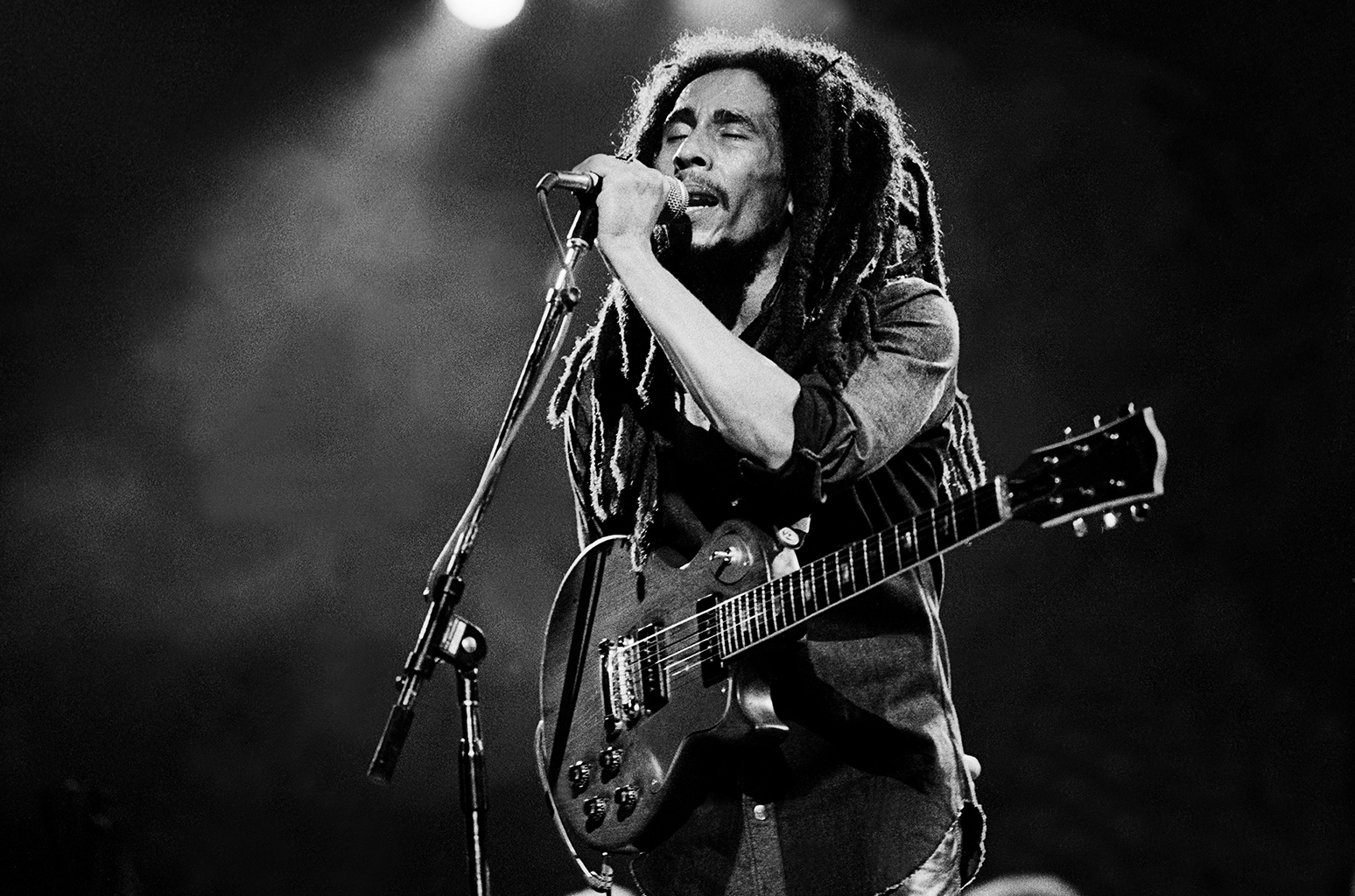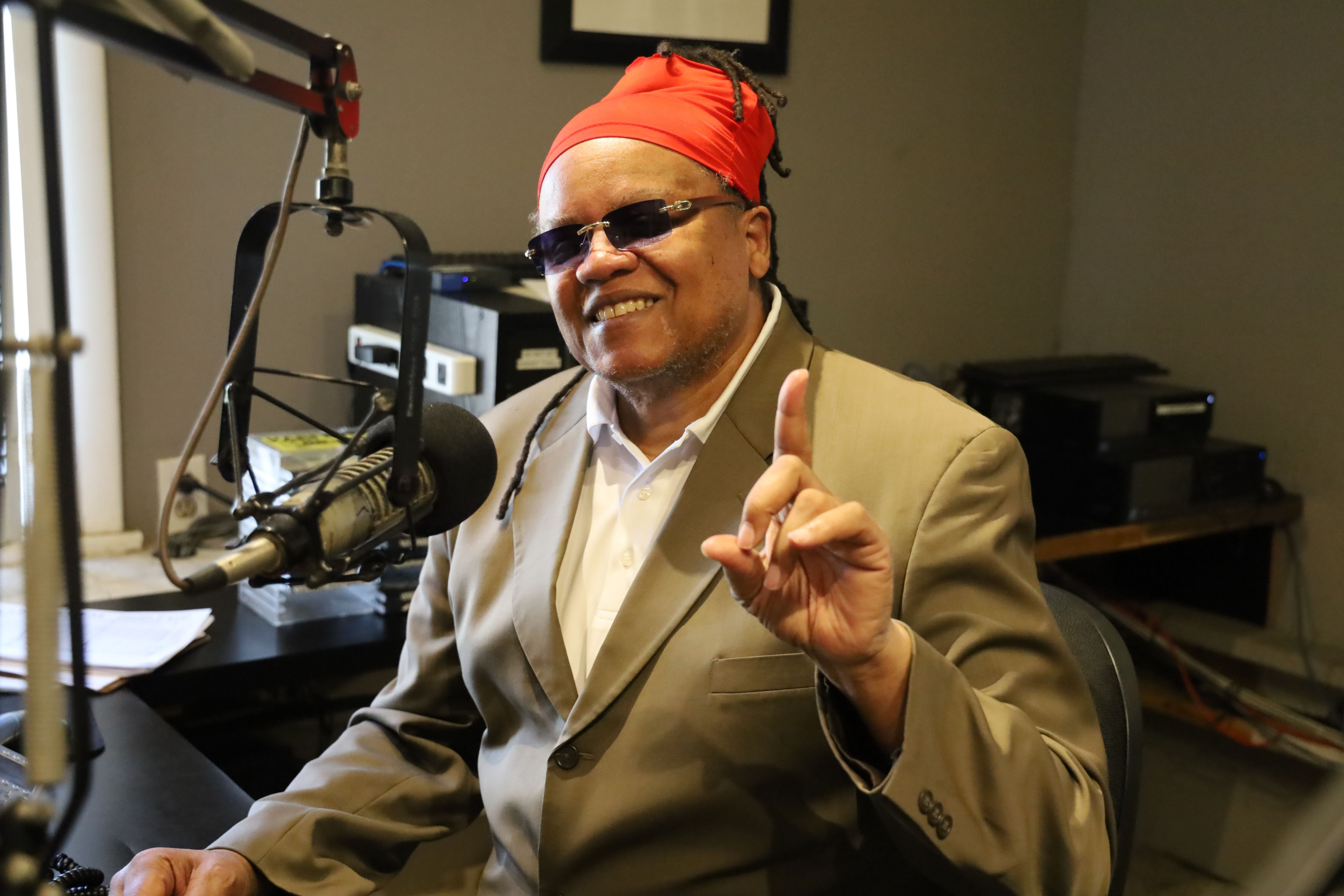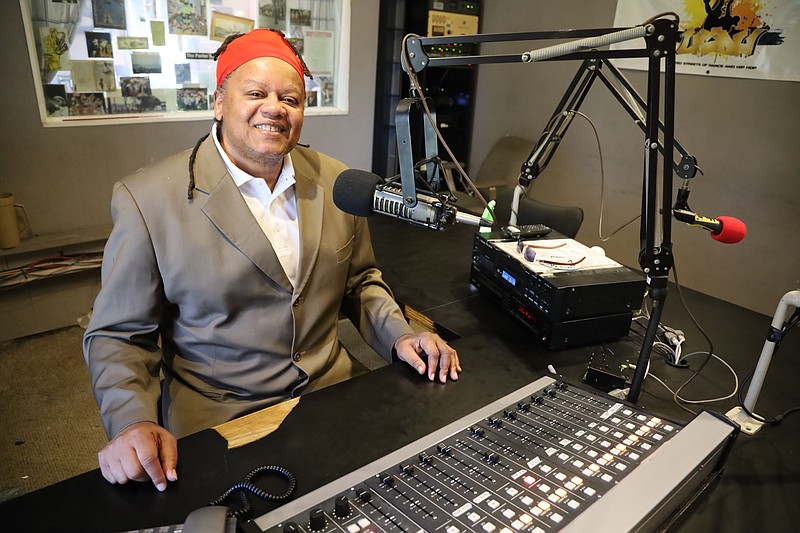It's 5 o'clock in Little Rock on a Thursday afternoon, the start of preaching for North Little Rock native Ras Levi.
His two-hour message is one of hope and love and unity, channeled through a single source of power and light in the universe. But it's not the gospel of Matthew, Mark, Luke or John that he sends out. Instead, Levi taps the Book of Reggae — its prophets and its greater and lesser saints — for his long-running weekly KABF-FM, 88.3 broadcast "One Love Reggae Party."
Listening to Levi and the sounds he purveys during his show is a most apropos way to celebrate African American Music Appreciation Month, which falls in June each year.
Levi, 61, is a foremost authority on reggae. While not an ordained minister in the religious sense, he is as fervent in his message as the most charismatic evangelist, having watched the music evolve into a global influence with shades of modern-day rock, pop and especially hip-hop. He revels in the genre's many forms, musical expressions and lyrical nuances; despite the passage of time, the music speaks to him as clearly as it did when first he heard a Bob Marley record as a teenager.
"It's just a unique type of music that brings so many different people together," he says. "Some of the love selections are not just about romantic love, but love of people and different types of people. It touches everybody, man. I don't care where you're from or what background, it reaches out and touches you. To me, it's just a beautiful thing."
Ron Brown, who would come to be known as Ras Levi, first heard that beautiful thing as a teen basketball prodigy in North Little Rock.
"I heard it first through one of my Jamaican friends," he recalls. "He was a track runner. He came to Philander to run track or whatever and I was in Upward Bound at the time over there, at the college in a summer program. I was about 14 maybe, and I just heard it one day. It kind of caught me off guard."
Levi's childhood household was awash in music, mainly old-school R&B. He himself had turned on to Elton John and the Eagles and would even dabble with playing in a band in high school. But the first delectable sips of reggae that managed to cut through the predominant radio formatting of the time refreshed him most.
"I heard a song one day called 'One Love' by Bob Marley on one of the R&B stations," he says. "That just took me. What on earth is this, you know? This guy talking about one love and let's get together and feel all right. It just kind of inspired me.
"At the same time, I heard of a group through my older brother and his friends who were big jazz fans. They turned me onto this band called Third World and [their song] 'Now That We Found Love' that was reggae as well. Just great music."
 The titan of the reggae movement was Bob Marley, who sparked a love of the genre by reggae DJ Ras Levi. Marley not only ushered reggae into a period of global popularity, he pushed the lyrical content from simple party tunes to issues of social justice and human rights.
The titan of the reggae movement was Bob Marley, who sparked a love of the genre by reggae DJ Ras Levi. Marley not only ushered reggae into a period of global popularity, he pushed the lyrical content from simple party tunes to issues of social justice and human rights.
MISUNDERSTOOD GENRE
Reggae is music that's vastly misunderstood by many Americans, a complex art form too often reduced to a syncopated beat, an island vibe and a baggie of ganja (marijuana). Most associate reggae with Jamaica ... but, while the island provided the birthing environment for the genre, its various strands of musical DNA are decidedly more diverse.
According to victrola.com, reggae is a relatively new invention, an amalgam of earlier musical formulas. These include traditional African and Caribbean music; jazz, R&B and rock imported from the United States and, importantly, earlier Jamaican styles ska and steadyrock. These previous formulas lent elements of the syncopation and instrumentation that would coalesce into a new form of music, reggae, in the 1960s.
Lyrically, reggae followed themes familiar to all other brands of music — love, relationships, enjoying the good times and weathering the bad. Its universality allowed it to spread quickly. By the 1970s it was being emulated by major acts including Led Zeppelin, with "D'yer Maker" in 1974; Eric Clapton, with his cover of Marley's "I Shot the Sheriff," also in 1974; and the Rolling Stones, via their cover of Eric Donaldson's classic "Cherry Oh Baby" in 1976.
The music was influencing other corners of the music world as well, as is noted on discovermusic.com. Listening carefully, one can hear it shade the Eagles' 1977 monster "Hotel California," Steely Dan's 1976 effort "Haitian Divorce" and Joe Walsh's 1979 smash "Life's Been Good." This trend continued into the 1980s with Blondie cutting "The Tide Is High," and throughout the catalogs of The Police and UB40.
Meanwhile, reggae artists themselves were making inroads with wider international audiences. As the website songfacts.com reveals, Johnny Nash scored the first reggae song to reach No. 1 in America with "I Can See Clearly Now" in 1972, later to be covered by Jamaican reggae stalwart Jimmy Cliff.
But far and away the titan of the reggae movement was Marley himself. A charismatic and captivating performer, he not only ushered reggae into a period of global popularity that launched a million posters into a million college dorm rooms, he pushed the lyrical content from simple party tunes to issues of social justice and human rights.
Along with blockbusters "Get Up, Stand Up," "No Woman, No Cry" and "Redemption Song" resides a list of other politically charged tunes including "Burnin' and Lootin,'" "Concrete Jungle," "Revolution" and "Real Situation." Detailing the hazards of life in the Kingstown slums connected reggae with a wider struggle for global social justice and was music to the ears, quite literally, to fans like Ras Levi.
A DEGREE IN REGGAE
During his collegiate years Levi studied health and physical education. But his true education came in learning about the art form that captured his imagination.
"I'm the type [that] once I learn about something I'm going to really get into it, and I found out about all different types of reggae," he says. "I started studying it and finding out about all the avenues of it. You have the roots reggae like Bob Marley. Then you have the lovers reggae, which is love songs. You've got dancehall; that's a little more up-tempo for the younger people. So many different forms of reggae."
When Levi returned to Central Arkansas in 1987, he toted his accumulated knowledge and unbounded love for the music with him. A year later he hit the local airwaves for the first time, landing a time slot on KABF.
"I figured, who else better than myself would know about the reggae?" he says with a chuckle. "I came and talked with the program director at that time and he said, 'Sure, man. Love to have you here. You seem to have a lot of knowledge about it.' That's how I got started. It wasn't about money at all; it was about the love."
Additional radio opportunities presented themselves through the 1990s — stations known at the time as Hot 96.5 and Foxy 99.5, to be precise. Through them, Levi was able to reach wider audiences with the music and help make connections between the original masters and the rap artists who were showing their musical influences.
"A lot of the younger artists bring that flavor that reaches out to different people, changing it just enough that people say, 'Oh, that's reggae? I like that,'" he says. "It might be a different rhythm or a different beat or a different message. You've got guys like Shaggy who will sing a different type of reggae that reaches everybody. It might not be so much political, religious or whatever. We're trying to reach some of everybody."
 Ras Levi is host of “One Love Reggae Party,” which can be heard at 5 p.m. Thursdays on KABF-FM, 88.3. Levi, born Ron Brown, fell in love with reggae as a teenager and studied it intently before first going on the air in 1988. (Special to the Democrat-Gazette/Dwain Hebda)
Ras Levi is host of “One Love Reggae Party,” which can be heard at 5 p.m. Thursdays on KABF-FM, 88.3. Levi, born Ron Brown, fell in love with reggae as a teenager and studied it intently before first going on the air in 1988. (Special to the Democrat-Gazette/Dwain Hebda)
ONE LOVE, MANY FORMS
Levi saw additional opportunities to promote the music through concerts and spent years putting on reggae shows locally at various venues. This, in turn, ballooned into more ambitious ideas including the Arkansas Reggae Festival and Bob Marley Birthday Bash, put on through his concert promotion company One Love Entertainment.
Over the years, the events attracted some of reggae's heavyweights including Bigga Haitian, Burning Spear, Yellowman, The Abyssinians and Marley's son Ky-Mani Marley, just to scratch the surface. After taking a two-year break for covid-19, Levi is looking to revive the festival events as part of his continuing quest to promote the music and bring it to the widest audience possible.
"Bob [Marley] inspired me with the One Love thing and I've been on a mission ever since," Levi says. "I just know I want to keep pushing and keep doing what I need to do to try to keep it out there, you know?
"It's been hard, but with the drive I've always had for it, I've got a lot of people really tuned into the music now."
There's never been a time when reggae has more potential for widespread fandom, Levi says. In a deeply divided political and social climate, as well as the residual stress and fatigue from more than two years of covid, reggae has the potential to be a potent binding agent among different kinds of people, he opines.
"Reggae crowds have always been diverse crowds. Sometimes you might have more of the African American population, depending on what type group you're bringing in. But it's to the point now where you can get Asian people, you get Hispanic people on the reggae. All different ages. You have people my age who were into it and are still into it; they still follow. You have so many different younger people now that's got into it."
Even being closely associated with marijuana isn't the turn-off it used to be, given the public's changing attitudes up to and including legalization.
THE GANJA FACTOR
"Now we know that marijuana is more like medicine," Levi says. "Musicians, they don't let it bother them. They still sing about it. To a certain extent, some people will stereotype it, but I don't think a lot of the musicians sweat it too much. Nowadays things are changing, people understand a little bit more, it's becoming more acceptable."
Levi hopes this all adds up to greater sponsorship of his reggae music festival, which he hopes to bring back to North Little Rock in 2023. If anyone can do it, it's he, says Chandler "Chubb" Hickman, longtime friend and fellow reggae enthusiast.
"Ras is Arkansas' reggae ambassador because he kept it going," he says. "You had other people that would come along and maybe catch it when it's hot and do a few shows or have a party, but Ras would take money off his kitchen table and take a loss to bring in a show. He sacrificed a lot to have that avenue for the people [who] love it and need it. He has fans all over the state. He has fans in Mississippi, Oklahoma; fans in Texas and Memphis.
"I see a challenge in sitting youngsters down and getting them to understand the more in-depth meaning behind the music," Hickman adds. "Like, what's the direction? You got a nice beat, but what are they actually saying? What's the message behind this song? That's something Ras does and something I want to be a part of as far as helping the younger generation connect that way."
Levi admits turning young people on to the art form is more challenging due to the many entertainment options they have and for the cult of instant gratification that dominates the modern world. But that isn't stopping him from laying down his weekly grooves over the radio, knowing that somewhere the magic of reggae is turning on another young fan.
"I like the path [the music] is going," he says. "The main thing is, it's never going to go away. It's never going to be diluted to the point where you don't ever recognize reggae, because you've got the guys that are still teaching a lot of the youth the foundation. They're teaching the basics of the music.
"The fans are very diverse and that itself shows what the music can bring to the table, what it does bring to the table. With a lot of the things that are going on, we've still got to deal with the love. We've still got to love one another, man. You know what I'm saying? That's why I still stick with this like glue."
Catch "One Love Reggae Party" at 5 p.m. Thursdays on KABF-FM 88.3.
